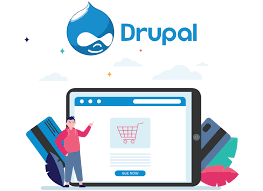The Power of Drupal Web Design
Drupal is a popular content management system (CMS) that offers a wide range of features and benefits for web design and development. With its flexibility, scalability, and robust capabilities, Drupal has become a go-to choice for creating dynamic and engaging websites.
Key Benefits of Drupal Web Design:
- Flexibility: Drupal provides a highly flexible framework that allows developers to create customised solutions tailored to specific needs. Its modular structure enables easy integration of various functionalities and features.
- Scalability: Whether you are building a small business website or a large enterprise platform, Drupal can scale to accommodate your requirements. It can handle high traffic volumes and complex content structures effectively.
- Security: Security is a top priority for any website. Drupal has a strong security track record with regular updates and patches to address vulnerabilities. Its robust security features help protect websites from potential threats.
- SEO-Friendly: Drupal is designed with search engine optimisation (SEO) in mind. It provides tools and modules that enable developers to optimise websites for better visibility in search engine results.
- Multilingual Support: For businesses operating in multiple regions, Drupal offers extensive multilingual support. You can create websites in different languages and manage content efficiently across various language versions.
The Future of Web Design with Drupal
As the digital landscape continues to evolve, the demand for innovative web design solutions is on the rise. Drupal remains at the forefront of this evolution, empowering designers and developers to create cutting-edge websites that deliver exceptional user experiences.
Whether you are looking to revamp your existing website or embark on a new web design project, consider harnessing the power of Drupal. Its rich feature set, flexibility, and scalability make it an ideal choice for building dynamic and engaging websites that stand out in today’s competitive online environment.
Top 5 FAQs on Drupal Web Design: Understanding Its Features, Suitability, and Security
- What is Drupal and how does it differ from other content management systems?
- Is Drupal suitable for small businesses or is it more geared towards larger enterprises?
- What are the key features and benefits of using Drupal for web design?
- How secure is Drupal as a platform for building websites?
- Does Drupal offer support for e-commerce functionality and integration with third-party systems?
What is Drupal and how does it differ from other content management systems?
Drupal is a robust content management system (CMS) renowned for its flexibility and scalability. What sets Drupal apart from other CMS platforms is its highly customisable nature and extensive range of features. Unlike some CMS options that may have limitations in terms of design and functionality, Drupal offers a modular framework that allows for tailored solutions to meet specific needs. Its scalability makes it suitable for projects of all sizes, from small business websites to large enterprise platforms. Additionally, Drupal’s active community support and commitment to security updates contribute to its reputation as a reliable and powerful CMS choice for those seeking a dynamic and versatile web design solution.
Is Drupal suitable for small businesses or is it more geared towards larger enterprises?
When considering whether Drupal is suitable for small businesses or more geared towards larger enterprises, it’s important to note that Drupal’s flexibility and scalability make it a viable option for businesses of all sizes. While Drupal is often associated with larger enterprise websites due to its robust features and capabilities for handling complex content structures and high traffic volumes, it can also be effectively utilised by small businesses. Small businesses can benefit from Drupal’s customisation options, SEO-friendly features, security enhancements, and multilingual support to create professional and dynamic websites that align with their specific needs and goals. With the right expertise and guidance, small businesses can leverage Drupal to build a strong online presence and enhance their digital marketing efforts.
What are the key features and benefits of using Drupal for web design?
When considering the key features and benefits of using Drupal for web design, it becomes evident that Drupal stands out as a powerful content management system (CMS) that offers unparalleled flexibility and scalability. One of the primary advantages of Drupal is its modular architecture, allowing for customisation and integration of various functionalities to meet specific design requirements. Additionally, Drupal’s robust security features, regular updates, and patches ensure websites built on this platform are well-protected against potential threats. Furthermore, Drupal’s SEO-friendly nature, multilingual support, and ability to handle high traffic volumes make it a preferred choice for businesses looking to create dynamic and engaging websites that deliver exceptional user experiences.
How secure is Drupal as a platform for building websites?
When it comes to security, Drupal is renowned for its robust measures and proactive approach in safeguarding websites. As a platform for building websites, Drupal has a strong track record of prioritising security with regular updates and patches to address any vulnerabilities that may arise. With a dedicated security team and a community of developers constantly monitoring and enhancing the platform’s security features, Drupal offers a secure environment for website owners. By following best practices in web development and leveraging Drupal’s built-in security tools, website administrators can significantly reduce the risk of potential threats and ensure the safety of their online assets.
Does Drupal offer support for e-commerce functionality and integration with third-party systems?
When it comes to e-commerce functionality and integration with third-party systems, Drupal shines as a versatile platform that caters to these needs effectively. Drupal offers robust support for e-commerce capabilities through various modules and extensions, allowing businesses to create seamless online shopping experiences for their customers. Additionally, Drupal’s flexibility enables smooth integration with third-party systems such as payment gateways, CRM tools, and marketing platforms, enhancing the overall functionality and performance of e-commerce websites. With Drupal’s extensive features and customisation options, businesses can leverage its capabilities to streamline their online operations and drive success in the competitive digital marketplace.

